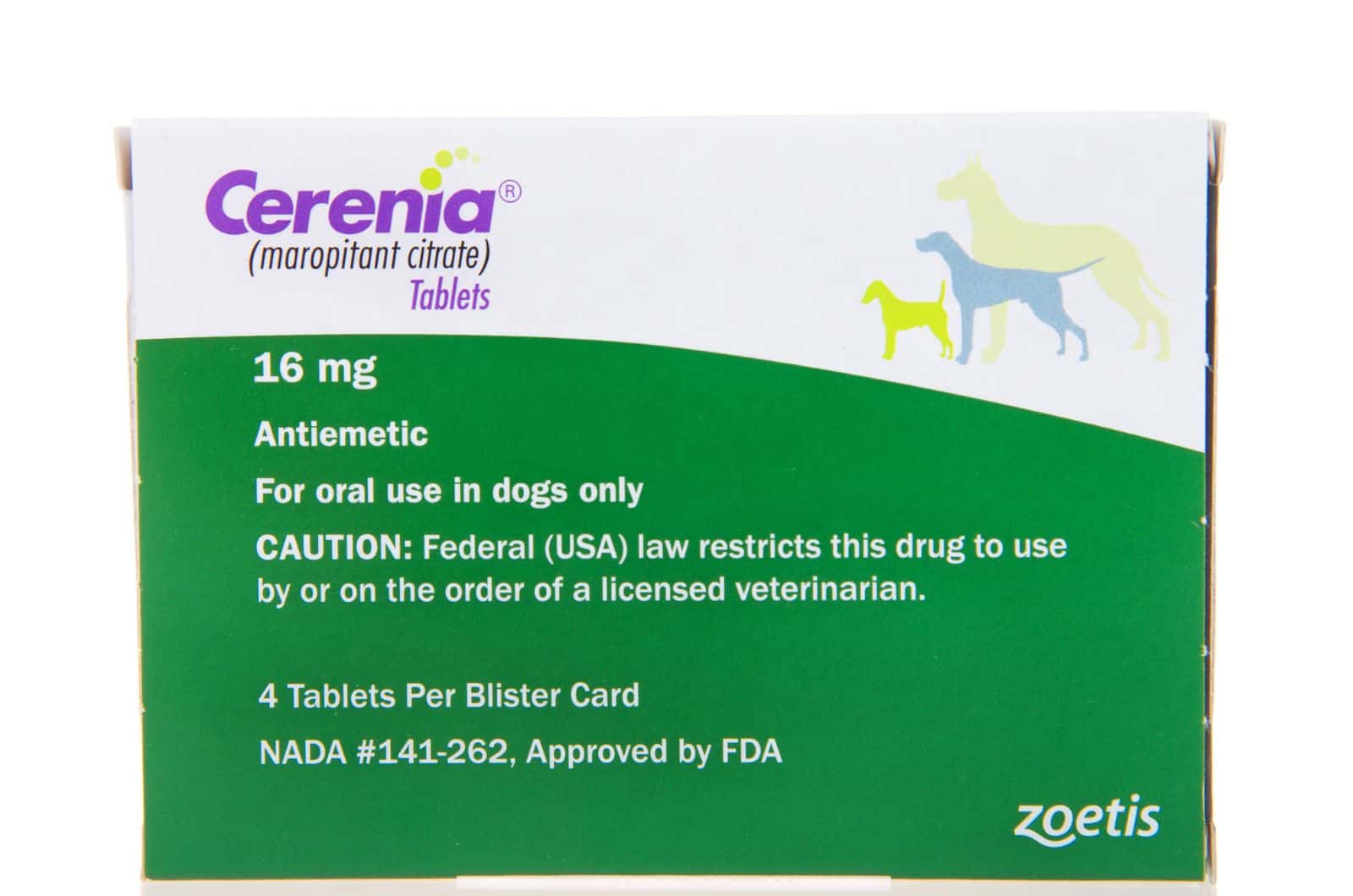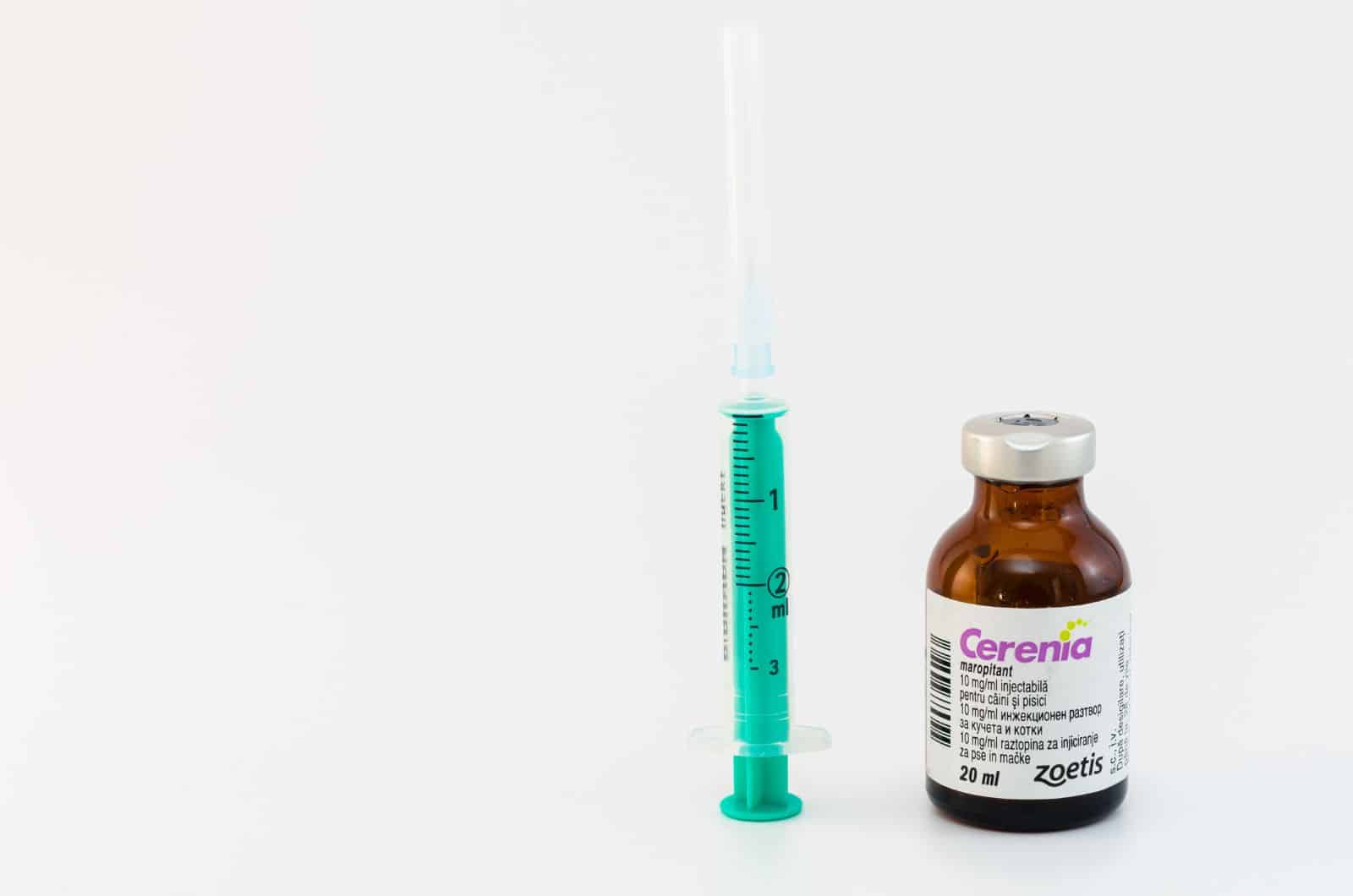Losing a dog is never easy, no matter the situation. Those furry creatures become an essential part of our being, so for most of us, we cannot imagine our life without waking up to their happy smiles, energetic runs, and wiggly tails.
If you lost your dog, first and foremost, I would like to express my deepest condolences for your loss. This is the pain that no dog owner wants to experience, especially if it happens quickly and unexpectedly.
When a dog dies from old age, we at least know that he or she lived a long and happy life and that death came as the most natural thing; however, when something causes your dog to die in a painful and very unexpected way, it makes it very difficult to cope with the situation.
In today’s article, we are shedding light on the very concerning and, unfortunately, increasingly frequent matter, such as the case of a drug called Cerenia causing the death of many dogs.
Many dog owners experienced the death of their dog after being given this medication which was supposed to help them, not make it all worse, so they are trying to find answers to many questions regarding the matter.
Comments like “Cerenia killed my dog” or “my dog died from Cerenia” are flooding the internet, and we are here today to help you find the answer to whether it is actually possible and how and why it happened.
Investigating: Is It Possible That Cerenia Killed My Dog?

Every dog owner that lost their dog to an unfortunate series of events is, of course, looking for answers and the truth. After reading many confessions and speaking with some acquaintances that came to me for help, I started noticing the same pattern:
A dog gets prescribed a medication called Cerenia that helps treat vomiting in dogs and cats. Soon after taking the medication, the dog gets even sicker, which leads to their death.
While, at first, the obvious cause of death might seem to be the medication, before jumping to any conclusion, there are a lot of factors that need to be taken into account.
Meds are great in helping people and animals feel better, but we all know that no drug is completely harmless. There are always certain side effects that may occur in certain cases, which we need to be aware of.
In a field study conducted in the USA, it was shown that dogs that were treated with Cerenia medication (either tablets or injections) experienced more adverse reactions (including death) than those dogs treated with a placebo.
So, to answer your question, “Is it possible that Cerenia killed my dog?”, well, yes, it is possible, however, things are not always that simple. Many believe that the actual cause of death is some underlying issue that caused the dog to vomit in the first place, and not the drug itself.
This should also be taken into consideration, although, of course, with the benefit of the doubt. In order to investigate the matter in more detail, we need to get familiar with the drug in question, so let’s see what Cerenia actually is, how it should be dosed, and if there are any side effects.
Prime Suspect: Cerenia (Maropitant Citrate)

Cerenia or maropitant citrate is an FDA-approved antiemetic medication used for treating acute vomiting in dogs and cats and motion sickness.
It is a prescription drug, which means that it needs to be prescribed by a licensed veterinarian, so you’ll hardly find it over the counter somewhere.
Cerenia works in a way that it blocks particular receptors that cause vomiting, thus effectively stopping it from happening. This medication comes in two different forms, as a tablet and an injection. Tablets are more commonly used, although in some cases, injections are needed.
In such cases, your dog might need to stay at the clinic. When giving your dog Cerenia tablets orally at home, please follow the instructions of your vet.
What Is The Recommended Dosage For Cerenia?
The recommended dose of Cerenia depends on your dog’s health, age, body weight, and the form of Cerenia medication you are using.
If you are using Cerenia tablets for the prevention of acute vomiting for dogs between two and seven months of age, the minimum dose should be 0.9 mg for a pound of body weight or 2 mg/kg once daily for five consecutive days.
For dogs older than 7 months of age, Cerenia is dosed in the same amount as previously described until the acute vomiting stops.
If you are using Cerenia tablets for the prevention of dog vomiting caused by car sickness, you should administer tablets at least two hours prior to travel. Refrain from feeding your dog a full meal prior to traveling or giving tablets on an empty stomach.
A light meal an hour before administering tablets has been proved and recommended as the best-case scenario.
When it comes to the prevention of vomiting due to motion sickness, the recommended dosage of Cerenia tablets for dogs four months of age and older is 3.6 mg/lb or 8 mg/kg once daily for two consecutive days.
Cerenia may also be used to prevent vomiting due to chemotherapy in dogs that are suffering from cancer. In such cases, the veterinarian is going to strictly determine the type and the dosage of the medication according to your dog’s condition.
Cerenia injections should not be used together with Cerenia tablets for the prevention of vomiting due to motion sickness.
For reference and detailed description of all important details regarding Cerenia medication for dogs, see this FDA report.
READ ALSO: Why Do Dogs Pant In The Car: 10 Causes & Solutions You Must Know
Cerenia As A Treatment For Pancreatitis
Acute or chronic pancreatitis is a condition of an inflamed pancreas. The most common symptoms of pancreatitis are nausea, vomiting, fever, pain, lethargy, and loss of appetite.
Cerenia is very often used as a medication for pancreatitis. Its anti-emetic and anti-inflammatory benefits have been known as very effective in dealing with nausea, vomiting, and abdominal pain caused by pancreatitis.
That being said, Cerenia is by no means a cure for pancreatitis, just a medication that helps relieve the symptoms. Vets often advise having a couple of Cerenia tablets at home in case of a flare-up. Cerenia tablets for pancreatitis should be administered once daily for five consecutive days max.
RELATED: Why Does My Dog Poop So Much? Healthy Pooping Amounts
When Should You Not Give Cerenia To Your Dog?
You should never give Cerenia to your puppies that are younger than 16 weeks of age. If your dog is suffering from some health conditions such as liver or heart diseases, Cerenia should also be avoided or administered only under strict veterinarian supervision.
Pet owners should also avoid giving this medication to their dogs that are suffering from gastrointestinal or kidney diseases, or toxin ingestion, as these may interfere with the effect of the drug.
Avoid giving Cerenia to pregnant or lactating dogs as the safety of this medication for this particular dog group has not been established yet.
First-time users of Cerenia may experience serious allergic reactions to this drug, so you should take extra precautions in case any allergic reactions occur, such as difficulty breathing, swelling, or hives.
What Drugs Should Never Be Given With Cerenia?
Before your veterinarian prescribes Cerenia to your dog, he or she should be aware of all conditions your pup might be suffering from or if taking some other medication.
It is possible for Cerenia to interact with other drugs, so it is very important to give your vet your dog’s full medical history for your pet’s safety.
Cerenia is not safe to combine with:
• Non-steroidal anti-inflammatory drugs (NSAIDs)
• Antifungal medications (ketoconazole)
• Seizure medications (phenobarbital)
• Antibiotics (chloramphenicol)
• Certain types of thyroid hormone supplements
• Behavioral medications
Mixing Cerenia medication with any of these drugs can cause serious health problems to your dog or even cause death, so please be extremely careful with this, as it can be one of the reasons why Cerenia could kill your dog.
How Long Does Cerenia Stay In A Dog’s System?
It takes one to two hours for Cerenia to fully dissolve and reach its maximum efficiency, and it stays effective in the dog’s system for 24h. This is the reason why you should always follow the instructions on the usage of the medication.
Usually, in case of treating acute vomiting, the medication should be given daily for five consecutive days, so if you stop the usage on your own, vomiting can come back and cause some other health issues.
Always listen to your veterinarian, but if you do notice some changes or adverse effects, contact the clinic or emergency care immediately.
Cerenia Side Effects

Every drug, no matter if it is for pets or humans, has a list of potential side effects that might or might not happen. While most of us are used to taking anything that will stop the pain without even reading that fine print that includes all side effects, this is definitely not a good approach.
Side effects are there for a reason, and it is your responsibility as a pet owner to carefully read about them and look out for them if they appear after giving your dog this medication.
Here are the known side effects of Cerenia that have been reported since the drug appeared on the market:
• diarrhea
• drowsiness
• excessive drooling or hypersalivation
• vomiting
• bloody stools
• lethargy or tiredness (depression)
• lack or loss of appetite (anorexia)
• muscle tremors
• ear inflammation
• pain or swelling (if using Cerenia injections)
• death
We cannot highlight enough how important it is to consult your veterinarian if you think that your dog is showing any of these symptoms upon the consumption of the drug Cerenia, so for your beloved pet’s safety, please be careful.
This advice also applies to other drugs with potentially serious side effects.
READ ALSO: All About Dog Behavior Before Death: 14 Signs Explained
How Is Cerenia Fatal To Dogs?
The use of Cerenia drugs can cause the death of dogs in a couple of different ways. One of the possible side effects that we have mentioned above is actually the death of the pet. If possible adverse reactions are not treated properly and on time, death can come as a result of all the complications.
Dogs, just like humans, can be allergic to some medications, so it is also possible that an allergic reaction provoked by the drug causes the death of the dog.
Another very common cause of death is actually some harmful substance (toxin, bacteria, virus) that causes vomiting and nausea in the first place. You can actually calm down vomiting by giving your dog Cerenia; however, you are not actually getting rid of toxins that make your dog sick.
Not properly treating the true reason behind your dog’s sickness, but just masking the symptoms with Cerenia can, unfortunately, lead to the death of your dog.
This is why it is very important to use Cerenia only after your dog has undergone extensive testing (such as blood work and x-rays) to make sure that there are no underlying issues causing your dog to vomit.
Using Cerenia daily or overdosing on the drug can affect the dog’s central nervous system and cause many serious health issues that can cause the premature death of your dog.
Please, follow your vet’s instructions on the use of the drug, and if you are not confident with giving your pup this kind of medication, please seek some other options.
RELATED: 15 Signs A Dog Is Dying: When Should You Say Goodbye?
What To Do If The Suspected Cause Of Death Is Cerenia?

If you suspect or you are certain that the cause of your dog’s death is exactly the drug Cerenia, then there are some things you can do to prove it.
First and foremost, you will have to apply for an autopsy. An autopsy is a post-mortem examination that will discover if your dog truly died from the administration of the drug or some other underlying toxicity issues that you didn’t know about.
If you have your dog’s medical records prior to taking the medication, stating that your pup was not suffering from any medical conditions, there is a possibility of a drug company paying for an autopsy; however, you should discuss that directly with the drug company.
If the autopsy indeed shows the drug’s adverse reactions actually were the cause of the death of your beloved dog, you can file a complaint with the drug company directly or report the experience to the Food and Drug Administration (FDA).
To report an adverse event, contact Zoetis US Inc. at 1-888-963-8471. Have all your medical records prepared, and be also prepared to give the information about your dog and how everything happened.
The drug company is obliged to report this to the FDA; however, you can also do it yourself directly on the FDA website. All necessary information can be found here.
Alternative Options To Cerenia
If you are, after reading all this, scared to give your dog this medication, or you just want to be extra cautious – which is very understandable – the good news is that there are some safe options (both natural and synthetic) that will not cause harm to your furry friend.
Take a look at the list of safe alternative options to Cerenia:
CBD Oil
Recently, CBD oil has become a very famous method of alternative therapy, not only for pets like in this case, but also for humans.
Cannabidiol oil, or CBD oil, is a product derived from the Cannabis plant that does not contain the psychoactive ingredient THC (tetrahydrocannabinol).
Often dogs experience an upset stomach and vomiting due to feelings of stress and anxiety. CBD oil has proved to be very successful in managing motion sickness and anxious feelings. It helps with inflammation that causes sickness and gives an overall anti-nausea and calming effect.
Many dog owners have decided to give their pups hemp-formulated treats or CBD oil in order to help their dogs relax and prevent vomiting caused by car sickness, so this is definitely an option that you can try.
However, we still advise that you consult your vet beforehand and seek their professional advice. Although CBD oil is definitely a more natural method of treating dogs than a synthetic medicine like Cerenia, there still hasn’t been constructive research done on possible long-term effects.
Alternative Medication
Meclizine, Benadryl, and Dramamine are all medications that can be used as an alternative to Cerenia.
• Meclizine is an antihistamine that is used to treat and prevent motion sickness that includes dizziness, nausea, vomiting, and anxiety. Possible side effects include sleepiness and dry mouth.
• Benadryl is an over-the-counter medication that can be used to reduce inflammation and treat nausea and vomiting. Possible side effects include drowsiness, hypersalivation, dry mouth, or rapid breathing.
• Dramamine is another medicine used to treat nausea and vomiting caused by motion sickness. It is often seen as a more gentle version of Benadryl.
As you might have noticed, all these meds are actually human medications that are often prescribed by vets as an off-label medication, therefore, they should only be used if and how your veterinarian has recommended them.
Practice Car Rides
It has been found that in most cases, it is not actually the car ride that causes sickness in dogs but rather the feeling of stress and anxiety that is associated with it. Stress actually causes inflammation, nausea, and sickness, which we then call motion sickness.
In order to reduce the amount of stress your dog feels while in the car, many veterinarians and behaviorists recommend taking short practice car rides and getting your dog used to the feeling of driving in the car.
A couple of minutes in the car is enough for a start, and then you can slowly start increasing the time spent in the car if you notice that your dog is okay with it.
Reducing Food Intake
Before leaving for a long drive, it is a good idea to plan your dog’s meals ahead of time and reduce the food intake amount. In case your dog gets stressed and nauseous, it is always better if he/she doesn’t have a stomach full of food, which can just worsen the vomiting.
It is important to mention that you should never deprive your dog of food, quite contrary, this would include having more meals a day, just with a reduced amount of food.
Calming Scents
Some scents have been known for their calming properties and reducing stress in dogs, for example, lavender, vanilla, and ginger all have great potential for calming your dog and thus reducing the possibility of motion sickness.
Ginger, for example, is packed with antioxidants and anti-inflammatory properties that can help soothe an upset stomach and feelings of nausea.
If your dog has some comfort toys or anything that calms them and makes them more comfortable, bring them with you on car rides because it can help them with being stressed.
Case Closed

We have come to the end of our investigation of “Is it possible that Cerenia killed my dog?” and this is what we have concluded.
According to the FDA, there is still no direct evidence that links the deaths of dogs to the Cerenia drug, so the majority of veterinarians still recommend it as a safe way of treating acute vomiting or motion sickness.
One thing that you should always remember is that this is still a medication that has its side effects, and death is listed as one of them, so it is possible that, in some unfortunate cases, it happens.
No dog is the same, nor is its reaction to sickness and drugs the same, so preventative caution is always highly advised. Use the drug only as your veterinarian has recommended and if you notice any reactions, please contact the vet immediately.
To those that lost their beloved dogs to this medication, there is nothing that we can say that can ease your pain.
We are very sorry this had to happen, and we can only hope that your pup is safe now in doggy heaven, watching over and protecting you from above.
Read Next:
• Signs Your Dog With Diabetes Is Dying, Plus Other Complications
• When To Put A Dog Down With Torn ACL? 10 Factors To Consider
• Vetmedin Killed My Dog, But The Truth Is Not That Simple
